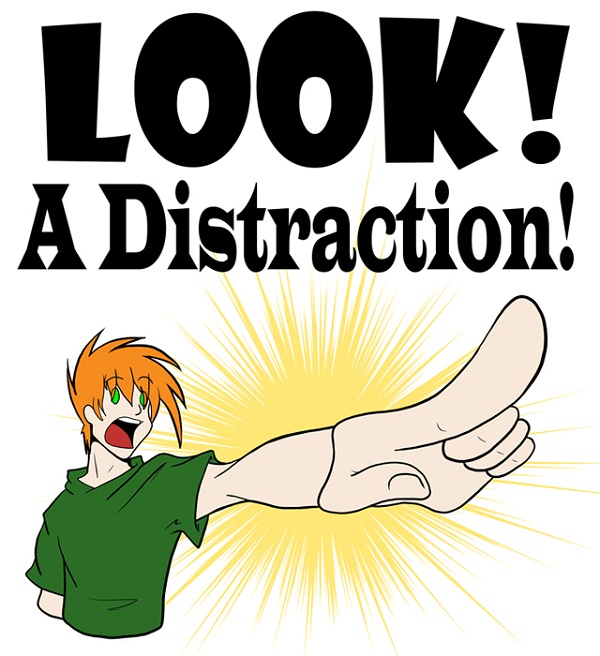How many of your work hours are actually productive? The productive hours are those spent in creating or accomplishing something.
If ones calculate honestly, we spend about 4 hours out of 8-9 hours in actual productive work. The reason for this is distraction. Distraction is the enemy of focus.
Avoiding distractions calls for specific work management skills. In The 7 Habits of Highly Effective People, Stephen Covey makes a valid point. He says that if a person focuses more on the urgent matters which are otherwise unimportant, you might be considered efficient but he questions whether the attitude makes you effective?
Think about it.
For avoiding distractions, cut through the clutter and concentrate on core work. Robert M. Nideffer, a PhD and San Diego based performance psychologist and the President of Enhanced Performance Systems, says: “You have to pay attention to the most task-relevant cues. You’ve got to separate signal from noise”.
Here are 11 steps to avoiding distractions.

#1 Decide between Important and Not-so-Important Tasks
People usually spend a lot of time on unnecessary things. In other words, they fail to distinguish between the important and not-so-important tasks.
Why? This is because people are usually taught to complete all tasks without prioritization. Every task is important but one should learn to decide which task demands immediate attention and which should be queued.
Avoiding distraction without prioritization is tough.
#2 Emotional Well Being
Generally, people associate emotions to personal relationships and work life as something practical. But, what we often fail to realise is that our emotional well being influences our professional life.
Just a simple example – if your work pressure is same but your work output has decreased, it means that you’re not emotionally stable. Something is bugging you and obviously, unless it is out of the way, your work productivity will suffer.
Jeffrey P. Kahn, the President of WorkPsych Associates, says: “One of the hardest things to realise is when your own emotions are slowing you down. Listen to what people tell you. If they ask, ‘Are you okay?’ it’s appropriate to say, ‘I’m fine,’ but then ask yourself, ‘Am I okay?’ ” If, on the other hand, you feel frazzled, but everyone admires your ability to juggle a zillion tasks, then give yourself some credit: You’re multifocal. “I see that a lot, particularly among very successful people.”
#3 Organize your Work Desk
This is a common but very effective tip.
An organized work desk is essential to avoiding distractions. Usually, people have the tendency to pile up workload, according to importance. The important files are in the front while the secondary important ones take second place and this way, all files are piled up.
Stare at the desk and notice your stress levels increasing! Nideffer says, “As emotional arousal increases, focus becomes more difficult.” Take out a day and clear out the desk. You’ll notice you were getting worried about nothing.
Be selective.
#4 Clarify Boundaries for Avoiding Distractions
A lot of distractions happen due to interruptions. In a working atmosphere, colleagues are coming all the time and talking to you, catching up on gossip, and other distractive activities.
Often, people get engaged in such conversations because we think its impolite asking them to stop. But, it is essential to maintain boundaries. Drawing boundaries doesn’t mean becoming a recluse; all you have to do is let people know when it is appropriate to approach you. You can use the “plus, plus, dash trick” by Joy Baldridge, a time-management coach.
Baldridge says, “It takes the average person 2 to 15 minutes to recover from each interruption. Interruptions are the biggest time robbers and focus busters” Her trick is to say two nice things and then dash off. For example, “Hey, great to see you, I wish I could talk now. Right now isn’t good, though; let’s talk 3.”
#5 Compartmentalize Tasks
One of the best ways of avoiding distractions is to compartmentalize tasks. Once you get interruptions and work clutter out of the way, and prioritize everything. It helps to manage time if you compartmentalize tasks.
Compartmentalization happens in the mind. It’s like creating imaginary boxes and each box contains a specific task, according to priority.
This will help to do away with the feeling of overwhelm. Usually, we feel overwhelmed when faced with a lot of work. Compartmentalization eases everything and makes work move smoothly. It is one of the best time management solutions.
Endnote
Avoiding distractions is essential in every aspect of life. I hope this article will help you gain a better work life balance.
Leave a Reply